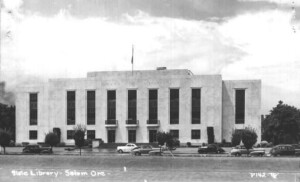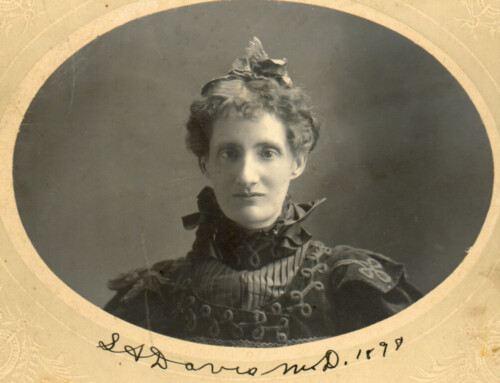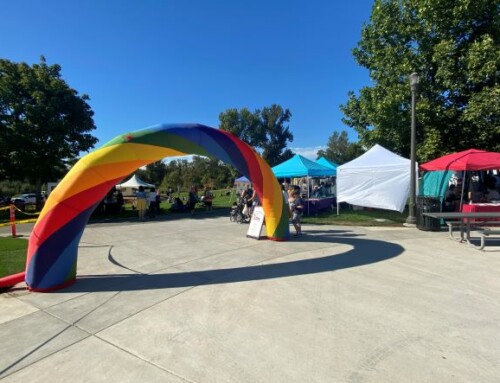Oregon State Library
The mission of the Oregon State Library is to promote the establishment, development, and support of library services to the people of Oregon; to provide library service that assists informed decision-making by the personnel of government; and to encourage cooperation between units of government and among libraries. The library is administered by a seven member Board of Trustees which selects a secretary to serve as state librarian and to administer the state library.

This is an exterior view of the front of the Oregon State Library Building, completed in 1938, on the Capitol Mall in Salem, Oregon. Cars line West Summer Street in front of the building., Salem Public Library OSL0033
A state supported library in Oregon began on August 14, 1848, when Oregon’s legislative assembly funded the purchase of a territorial library and appointed the first territorial librarian. In 1852 the territorial legislature provided funds for an annual salary for a librarian to administer the territorial library and for the relocation of the library in Salem. A fire in 1855 destroyed the library’s holdings, but under the direction of a new librarian the collection of books was renewed.
The first state legislative assembly established an annual budget for the purchase of books. Between 1868 and 1894 the State Library moved to different locations in Salem before finally locating in the state capitol. The 1878 legislative assembly appropriated funds to improve the library, to make it “…one of which the state might be proud.” Although improvements were made, a wind and rain storm blew the roof off of the capitol building in 1889 and soaked the library’s holdings.
The Oregon State Library in its modern form was established in 1905 when the Oregon State Library Commission was organized and provisions were made for the separate care of law books and for the separate collection of documents and books. Cornelia Marvin was appointed as the first secretary of the Oregon Library Commission. The commission consisted of the governor, state superintendent of public instruction, president of the State University (University of Oregon), librarian of the Portland Library Association, and one appointee.
An annual tax levy was created in 1905 to fund book purchases for school libraries. The books purchased came from a list selected by the commission and provided to public schools. The commission also provided traveling and debate libraries and assisted study clubs, granges, and home study programs in selecting material for their use.
In 1913 the Oregon Library Commission formally became the Board of Trustees of the Oregon State Library. The trustees were given custody of all the books and publications under the care of the commission and all of the federal and state documents and general books previously held by the Supreme Court Library (Territorial Library). Functions and collection policies for the Supreme Court Library were now focused entirely on law. The Board of Trustees, created to “…keep the close connection between the library and other educational interests,” inherited the responsibilities of the commission.
World War I led to the addition of war service responsibilities to the State Library’s function. Educational courses, distribution of books and pamphlets to housewives and military camps, and the establishment of the War Libraries Fund were added functions of the state library. State Librarian Cornelia Marvin was appointed State Historian of Defense for Oregon and was assigned to collect and preserve the records of Oregon’s war service.
In 1932 the Library of Congress designated the state library as a Regional Library for the Blind and Physically Handicapped.
The 1930s also saw the need for a new library building. Economic conditions brought on by the Great Depression, however, left little room in the state budget for this building. In 1935 the Public Works Administration provided funds for a new building, but, because of limitations in its constitution, the state was unable to accept this money. The 1939 legislative assembly quickly passed legislation enabling the state to accept federal aid, including WPA funds for the present day library on the capitol mall. WPA money also provided the library with the personnel to operate library centers, bookmobiles, and to repair and clean the holdings of the state’s libraries. Legislation was provided in 1939 for the formation of regional libraries.
The state library’s efforts included a 1942 recommendation to assign an official archivist to the library to maintain the documents being collected. The budget for the 1945-1947 biennium included funds for a full-time archivist. David C. Duniway served as the first State Archivist beginning in 1946. The responsibilities of the newly created Archives Division included the preservation and custody of basic records of Oregon’s government, care for the administration of Special Collections for the State Library, surveys and appraisals of stored records of state and county agencies, and microfilming. The archives remained part of the state library until 1973 when it was transferred from the state library to the secretary of state’s office which served as the administrator of public records.
In 1949 the state library’s functions were reorganized to serve the public more efficiently. Legislation passed in 1953 removed authority from the state library for the pooled purchasing of books for public schools, improved the document exchange program at the state library, and simplified state library laws.
Budget cuts at both the state and federal levels hampered state library programs during the 1960s and 1970s. The Graduate Library Scholarship Program was suspended and not reinstated until the 1969-1970 academic year. However, in 1969 the legislative assembly appropriated funds, in addition to federal funds received, for the library to increase its participation in the federal program for the blind and physically impaired.
Since the 1970s the State Library has made changes in its laws enabling the library to obtain and distribute state and federal funds to local libraries. The library was also given charge of appointing the State Advisory Council on Libraries and the State Aid for Public Libraries Advisory Committee.
Compiled by Monica Mersinger
Bibliography:
Oregon Blue Book, Salem Public Library, Salem, OR
This article originally appeared on the original Salem Online History site and has not been updated since 2006.







Leave A Comment